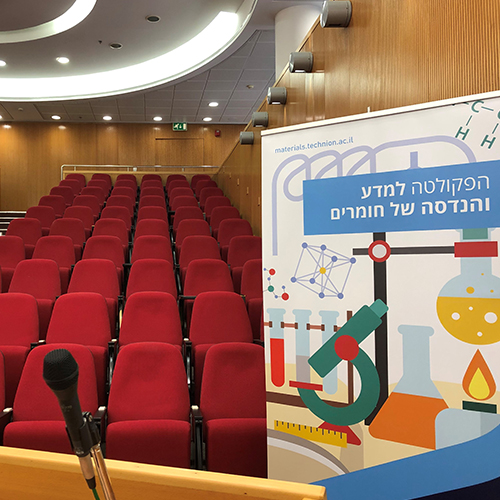
Ms. Yathreb Shalabi MSc candidate
08/01/2023
אודיטוריום ע"ש דויד וואנג, בניין מידן, קומה 3
14:30
An important microstructural feature of polycrystalline materials is grain size, since grain size and the respective area of grain boundaries affect mechanical and functional properties. As such, grain growth plays a significant role in microstructural evolution during sintering of polycrystalline materials. One of the most studied ceramic materials is 𝛼𝛼-alumina (α-𝐴𝐴𝑙𝑙2𝑂𝑂3), which has served as a paradigm for the study of grain growth and is important for technological applications.
Many studies showed that dopants and/or impurities can cause significant changes to the grain boundary mobility of materials. This can occur by equilibrium (Gibbsian) segregation of solutes to grain boundaries, which is driven by a reduction in grain boundary energy. The segregated solutes may then induce solute-drag or solute-acceleration, changing the grain boundary mobility and how the microstructure evolves. Alternatively, above the solubility limit, dopants and/or impurities can result in precipitation of secondary phases, which either reduce grain boundary mobility by Zener drag, or accelerate mobility by the formation of liquid phases.
This study investigates how Cr affects the effective mobility of grain boundaries in alumina. Considering that 𝐶𝐶𝑟𝑟2𝑂𝑂3 is completely soluble in alumina, we are able to study the solute-drag (or solute-acceleration) phenomenon over a wide range of concentrations. As compared with undoped alumina, Cr-doped alumina has a reduced effective mobility. This includes co-doped samples (Mg/Cr), where Mg is known to reduce grain boundary mobility by solute drag. Furthermore, Cr-doped alumina was found to have significantly more occluded pores than Mg-doped or undoped alumina. The possible mechanisms by which Cr influences grain boundary motion and pore occlusion will be discussed.
BIO
Yathreb completed her Bachelor of Science in Chemistry at the Hebrew University, Jerusalem, in 2019 and her BSc in Materials Engineering from Azrieli College of Engineering, Jerusalem, in 2020. During her undergraduate studies she participated in research on the development of fabrication methods for constructing devices based KLTN crystals in Prof. Aharon Agranat’s laboratory at the Department of Applied Physics.
Her MSc research topic in Kaplan’s group is The Influence of Cr on Microstructural Evolution of Alumina.


